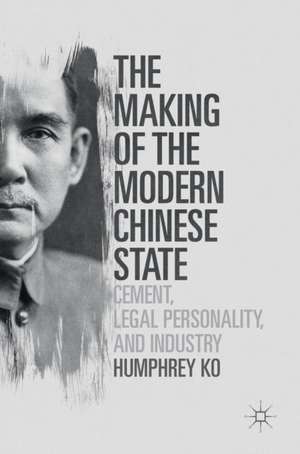The Making of the Modern Chinese State: Cement, Legal Personality and Industry
Autor Humphrey Koen Limba Engleză Hardback – 20 dec 2016
| Toate formatele și edițiile | Preț | Express |
|---|---|---|
| Paperback (1) | 637.28 lei 6-8 săpt. | |
| Springer Nature Singapore – 7 iul 2018 | 637.28 lei 6-8 săpt. | |
| Hardback (1) | 643.34 lei 6-8 săpt. | |
| Springer Nature Singapore – 20 dec 2016 | 643.34 lei 6-8 săpt. |
Preț: 643.34 lei
Preț vechi: 756.86 lei
-15% Nou
Puncte Express: 965
Preț estimativ în valută:
123.10€ • 128.28$ • 101.93£
123.10€ • 128.28$ • 101.93£
Carte tipărită la comandă
Livrare economică 03-17 aprilie
Preluare comenzi: 021 569.72.76
Specificații
ISBN-13: 9789811026591
ISBN-10: 9811026599
Pagini: 258
Ilustrații: XIII, 258 p. 8 illus.
Dimensiuni: 148 x 210 x 20 mm
Greutate: 0.5 kg
Ediția:1st ed. 2016
Editura: Springer Nature Singapore
Colecția Palgrave Macmillan
Locul publicării:Singapore, Singapore
ISBN-10: 9811026599
Pagini: 258
Ilustrații: XIII, 258 p. 8 illus.
Dimensiuni: 148 x 210 x 20 mm
Greutate: 0.5 kg
Ediția:1st ed. 2016
Editura: Springer Nature Singapore
Colecția Palgrave Macmillan
Locul publicării:Singapore, Singapore
Cuprins
Introduction: China, Cement and Corporations.- The Imperial System: Durable and Resilient.- New Corporate Powers: The Accelerator for Imperial Malfunction.- Yuan Shikai and his Cement Corporation: The Flight of State Power.- Sun Yat-sen and his Unincorporated Cement Works: Revolutionaries in Business.- The Pearl River Bridge: Recovering State Power.- Chiang Kai-shek and Corporations: A Holistic Strategy.- Conclusion: State Power, Corporations and the Cement Industry.
Notă biografică
Humphrey Ko is an Adjunct Associate Professor in the Faculty of Law at the University of Hong Kong and an Associate at the University of Oxford China Centre. With a DPhil in Modern Chinese History from University of Oxford, UK, he has lectured in Chinese studies at the Department of East Asian Studies of the University of Leeds, UK and taught Chinese history in the Institute for Chinese Studies at the University of Oxford.
Textul de pe ultima copertă
This text addresses the corporate causes of the collapse of the Qing dynasty and the emergence of modern Republican China. Weaving together political, legal and business histories, it focuses on the key relationship between China, cement and corporations, and demonstrates how the particular circumstances of cement manufacturing in nineteenth- and early twentieth-century China serve to illuminate key aspects of Chinese political economy and illustrate the importance of legal frameworks in the emergence of industrial enterprises. Examining the centrality of legal personality in China’s historical story, seen from the angle of cement manufacturing corporations, it offers an alternative historical perspective on the making of the modern Chinese States and delves into the involvement of larger-than-life historical figures of modern China such as Yuan Shikai, Chiang Kai-shek and the revolutionary and the father of modern China, Sun Yat-sen, in the unfolding of these events.
Caracteristici
Discusses the general relationship between China, cement and corporations. Offers a comparative study of the importance of legal personality in modern economic development. Considers the involvement of key figures such as Yuan Shikai, Chiang Kai-shek and Sun Yat-sen.
